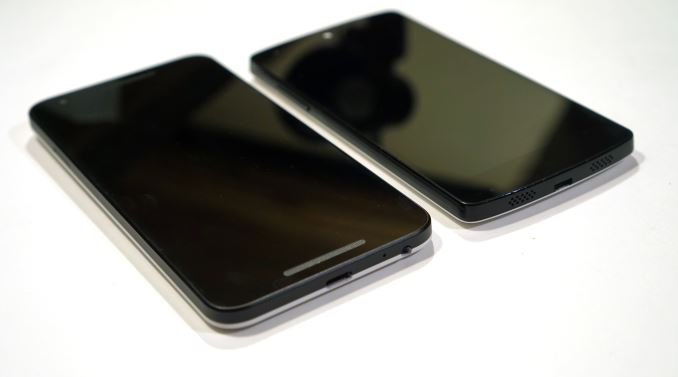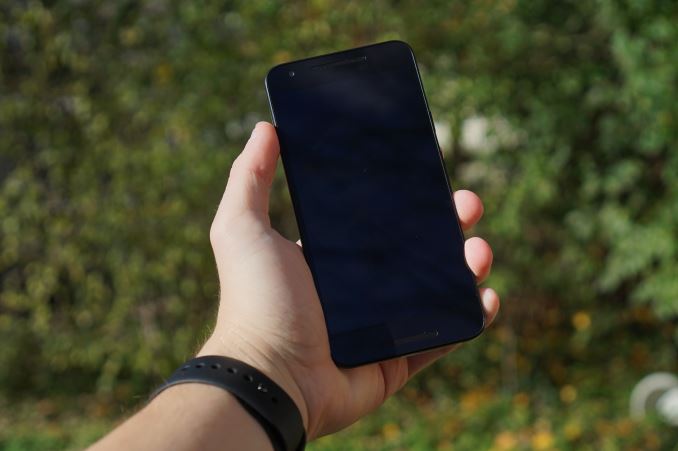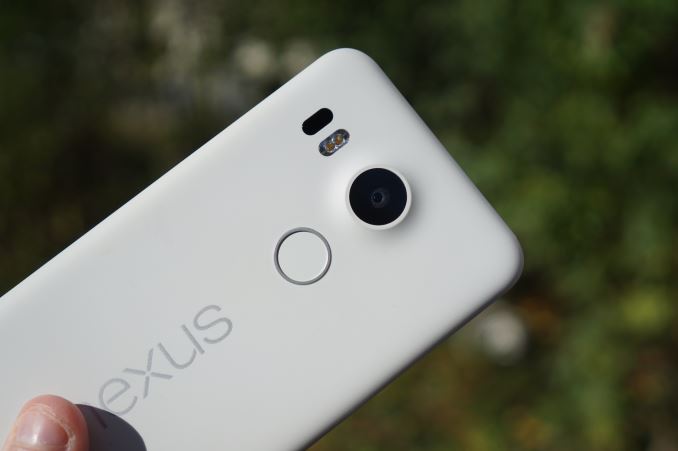The Google Nexus 5X Review
by Brandon Chester on November 9, 2015 8:00 AM EST- Posted in
- Smartphones
- LG
- Mobile
- Android 6.0
- Nexus 5X
Final Words
The Nexus 5X certainly isn't a perfect device. It's not meant to be a flagship phone and it's not priced like one; at $379 it's not the most expensive phone out there, but it's not exactly the cheapest one either. Still, I find myself really liking it despite its flaws. I definitely have a soft spot in my heart for the original Nexus 5, and I was quite disappointed when it didn't receive a true successor last year.
This year's 5X certainly is a true successor, but not every aspect delivers the improvements you would expect from a two year gap between releases. The performance isn't where you'd expect it to be, and Google's stance on disk encryption continues to reduce NAND performance. For all the things the 5X gets wrong though, it gets many other things really right. As always, it's nice to gather everything together in order to decide if a device is worth purchasing.
The design of the 5X is an interesting evolution of the LG Nexus industrial design. It's not as angular as the Nexus 5, but it's still very much a Nexus phone. The design delivered everything I expected from a successor to the Nexus 5, and I like it very much for what it is. The size of the phone is definitely pushing it for me, and I would opt for the size of the Nexus 5 if I had that option, but I also happen to struggle more than most people do with large devices. At $379 there's not much more you can realistically ask for than what the 5X's design and build quality offers.
The 5X's display is awesome, and there's really not much more that needs to be said. The Nexus 5 had a pretty good display for the time, but the 5X definitely takes the calibration and color reproduction to the next level. There's no more messed up low gamma curve, so the display doesn't have the washed out appearance that some people complained about with the Nexus 5's display. Brightness has also been boosted, and contrast is significantly higher too. I really couldn't ask for any more from an IPS LCD panel, and compared to what we got with last year's Nexus 6 the 5X is a breath of fresh air.
Performance is definitely an interesting case. To be frank, the 5X just isn't that much faster in many scenarios than the Nexus 5 was because of the heavy throttling. There's certainly improvement, but it's not what you would expect from two years of SoC progress. Snapdragon 808's heavy throttling means that for any task that taxes the CPU for over a couple of minutes you'd probably be better off with Snapdragon 801, and most certainly better off with 805. It's disappointing, but certainly forgivable when your device costs $379.
As for the GPU performance, Adreno 418 provides a healthy uplift in performance over Adreno 330, and beats Qualcomm's estimates which is great. What's interesting is that the Nexus 6 actually ends up pulling ahead despite being an older phone, which is just the result of how Qualcomm's GPUs were put onto their SoC roadmap. For $379 I think the GPU performance is solid, and there shouldn't be any problems running GPU intensive apps and games from Google Play.
NAND performance is definitely a big area of concern. I don't want to keep beating the issue to death, but Google needs to change their strategy here or they're going to fall very far behind in this regard and there will be no way to catch back up. Devices like the Galaxy S6, and even more so the iPhone 6s have shown how fast NAND speeds can reduce load times, reduce app install times, enable new camera abilities, and do many other things to improve the user experience. The gap between the storage performance of the LG G4 and the Nexus 5X is significant in size despite the two phones using the same NAND solution, and the end result is just completely unacceptable. On top of that, the use of the application processor to perform encryption has an enormous power penalty compared to a dedicated AES engine, which means there are potential battery life improvements just being left on the table.
That said, battery life on the Nexus 5X is quite good, although one should definitely note that the performance the Nexus 5X achieves in tests like BaseMark OS II's battery benchmark is behind that of competing devices that don't use Snapdragon 808 or 810. While it's a bit difficult to weigh these two things, it's essentially a question of whether or not it's worth it for a device to last for a long time when the performance over that period of time wouldn't have provided an enjoyable experience. In the end I think if you need the absolute best performance you're probably not going to opt for a non-flagship phone like the Nexus 5X anyway, and the battery life provided is more than adequate for the average user that will purchase it.
The last major thing to talk about is the camera. This is definitely a home run for Google. After a long period of n-1 cameras, or cameras that were up to par but lacking in processing, we finally get a Nexus device with an awesome camera. Both during the day and at night the quality was better than any of the other devices I used for comparisons, which included the previous two Nexus phones, the Galaxy S6 Edge, and the iPhone 6s. Low light was definitely the biggest victory, although I suspect that the Galaxy Note5 would come closer to the 5X than the S6 Edge does due to the improvements Samsung made to their image processing. In any case, the camera is as good as the flagship devices I've used, which is astonishing for a $379 device. The only drawbacks are the lack of OIS which contributes to shakier video than the previous Nexus phones put out, and the reliance on Google's HDR+ mode to achieve good results which puts a significant delay between shots and could introduce greater blurring in some circumstances. Even with those issues, I really love the Nexus 5X's camera, and it's become my everyday Android phone because of it.
Ultimately, the Nexus 5X is a true successor to the Nexus 5, and for $379 you really can't go wrong when buying one. You're getting a great display, a great camera, a great fingerprint scanner, good battery life, and a chassis that is most definitely plastic, but without any of the flex you see on cheaper devices. For me the camera alone sets the 5X apart from anything else in its price bracket, but pretty much every aspect of it is ahead of the competition at this price point unless you're willing to take a look at imports from Chinese manufacturers, which come with a whole host of other concerns regarding the warranty and network compatibility. The Nexus 5X definitely makes some tradeoffs in order to hit its price target, but if you're looking for a smartphone priced between $300 and $400 I highly recommend you take a look at the Nexus 5X.













197 Comments
View All Comments
zeeBomb - Monday, November 9, 2015 - link
Well well well! What do we have here? A 5x review without the 6P? I'll take it.Der2 - Monday, November 9, 2015 - link
Okay, read the whole review. Great work as always Brandon, and I just wanna put my thoughts out:That sustained performance though! Two minutes... Eek! Although that hits me right to my kokoro I think it isnt much of a big problem as someone like me who browses waaay more than gaming.
NAND performance. Oh man. One day AES hardware will be noticed. Or maybe a case of f2fs storage might help...hmm.
Its a blessing that Google is using great camera hardware for the first time. HDR+ All day every day kinda sucks as you basically have to rely on ISP and heavy processing, but as long as I get good photos out of it, I'm okay with that.
All in all, this is a great device for it's price point. Priced competitively and has good improvements over the original 5. It really comes down to how google can maintain such good outcomings of a phone for a lot cheaper than other OEMS...
And I will always respect them for doing so.
zeeBomb - Monday, November 9, 2015 - link
Wow, great stuff you mentioned there man (totally something I would say!) As google has some losses in this device, the GOOD does outweigh the BAD in this type of scenario, which I applaud google for. F2FS may be still young, but the innovation to multiply your read write speed is something I can wonder a lot of phones will benefit from.The 808 may be a bummer for some, but a wiser choice to implement without sacrifing so much performance, as it really comes down to Qualcomm to learn from their mistakes and hopefully not make a crucial mistake like this again.
BTW the camera...woot! Can walk around and snap pics like no tomorrow! (P.S: The 5X doesn't have EIS, but only the 6P does).
Billie Boyd - Friday, November 27, 2015 - link
Between 5x and N6. I recommend going for N6 instead. Its highly rated by the consumers based on satisfaction (see http://www.consumerrunner.com/top-10-best-headphon... for instance...)Kookas - Friday, December 18, 2015 - link
It's also huge, however. It's nice to keep devices that you have to carry about all day compact.coolhardware - Monday, November 9, 2015 - link
Enjoyed this one! Definitely more likely to look at picking up a 5X after reading the Anandtech review.Interesting to see where the Nexus 5X slots in with other Nexus devices, specifically when it comes to pixel density (PPI)
http://pixensity.com/search/?search=nexus
Kumar Anand - Tuesday, November 10, 2015 - link
I am running Wi-Fi throughput test on Nexus 5X using iperf and I am getting much higher numbers than anandtech. Here is information regarding my test bed -a) iperf version : 2.0.5
b) iperf command used:
iperf -s -w 512k -i1 -u
iperf -c <ip> -w 512k -i1 -t 300 -u -b 300M -P3
c) AP: Netgear R8000, VHT80, CH:157, Open Security.
d) Environment: OTA (over the air) in a clean environment (i.e. no interference from other clients)
e) 2 runs each for UDP DL/UL, each iperf run is for 5min (300s).
f ) 3 iperf parallel streams (iperf -P3 option)
RESULTS:
UDP Uplink (UL): 642 Mbps, 702 Mbps
UDP Downlink (DL)): 678 Mbps ,708 Mbps
anandtech - Could you please clarify regarding your tests? I am curious to understand why your numbers are not matching my peak numbers.
1) What is SW build loaded on your Nexus 5X?
2) What is the AP configuration and make and model?
3) What is the tool/command being used?
jay401 - Tuesday, November 10, 2015 - link
Does this phone have WiFi Calling?DLimmer - Thursday, November 12, 2015 - link
Yes and no. A quick summary of Google-Fi in this review would help answer this question.Yes: Google-Fi is Google's solution to phone plans/service. It replaces your current carrier at a pre-paid rate ($20 for unlimited U.S. text and voice, $10 per 1GB of data... only pay for the data you use). Google has sourced cellular service from 2 companies and many Wi-Fi hot spots, and has placed hardware in the 6, 6P and 5X to enable seamless usage and switching.
No: Wi-Fi calling is only available on the Google-Fi network.
As stated, only 3 phones currently possess the hardware to use Google-Fi.
Der2 - Monday, November 9, 2015 - link
In my opinion, this is Googles finest phone yet: where the fan has schoice to decide!